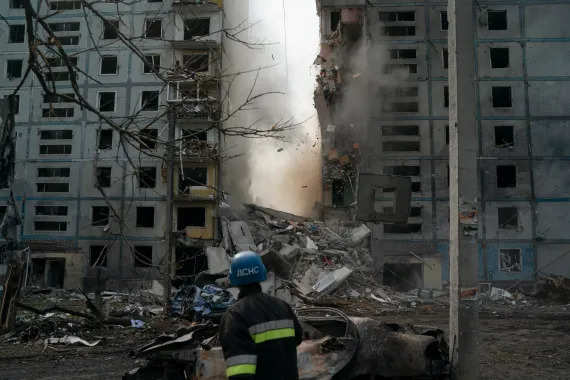Drones are attacking both capitals as the Ukraine battle reaches Moscow

On May 30, according to Russia, Ukrainian drones targeted affluent Moscow neighbourhoods in what one legislator dubbed the most dangerous attack on the city since World War Two. In the meantime, Kyiv also received an aerial attack for the third time in 24 hours.
The battle has primarily been fought inside Ukraine since Russia committed tens of thousands of troops into its neighbour in February 2022. With Russian soldiers entrenched behind an extended line in the east and south of Ukraine, aerial attacks on sites distant from the front have increased.
The Zaporizhzhia nuclear power facility is one of the critical southern locations Russian forces have seized almost since the beginning of the invasion. On May 30, the head of the United Nations' nuclear watchdog asked Ukraine and Russia to abide by five rules to protect the station. Neither Russia nor Ukraine have made a commitment to uphold the values.
Rafael Grossi, the head of the International Atomic Energy Agency (IAEA), has been working to reach a deal to lessen the possibility of a catastrophic nuclear accident caused by military activities, such as shelling at Zaporizhzhia, the largest nuclear power station in Europe, for months.
The principles, according to Grossi in a briefing to the U.N. Security Council, are that there should be no attack on or from the facility and that it shouldn't be used as a base for military hardware and heavy weapons. He demanded that the plant have reliable, secure off-site power. According to Grossi, the situation relating to nuclear safety and security at the Zaporizhzhia nuclear power station "remains highly precarious and weak." Military operations are still taking place in the area and could get much worse soon.
"Mr Grossi's ideas to safeguard the security of the Zaporizhzhia nuclear power station are in line with the procedures that we've already been adopting for a long time," said Vassily Nebenzia, Russia's ambassador to the United Nations. Sergiy Kyslytsya, the ambassador of Ukraine to the United Nations, stated that the demands for the station's complete demilitarisation and deoccupation must be added to the principles.
According to the defence ministry, eight drones sent by Ukraine and intended for civilian targets were shot down or diverted with electronic jammers during the early-morning airstrikes in Moscow on May 30. However, Baza, a Telegram channel with connections to the security services, claimed there were more than 25 drones involved.
The principles, according to Grossi in a briefing to the U.N. Security Council, are that there should be no attack on or from the facility and that it shouldn't be used as a base for military hardware and heavy weapons. He demanded that the plant have reliable, secure off-site power. According to Grossi, the situation relating to nuclear safety and security at the Zaporizhzhia nuclear power station "remains highly precarious and weak." Military operations are still taking place in the area and could get much worse soon.
Ukrainian presidential adviser Mykhailo Podolyak denied that Kyiv was personally involved but said that "we are glad to watch events" and predicted more such attacks. The mayor of Moscow reported that two individuals were hurt while some apartment buildings were momentarily evacuated. Neighbors reported hearing loud explosions and then smelling petrol. A drone being shot down and a smoke plume were captured on camera.
The elite neighbourhoods in Moscow, including those where Russian President Vladimir Putin lives, were among those the drones targeted. He later attended a briefing on the attack in the Kremlin, according to a spokesperson. Later, Putin claimed that Russia's air defences will be enhanced and that Ukraine's largest drone attack on Moscow was an effort to terrify and provoke Russia.
Since the beginning of the war, Russian drones and missiles have frequently attacked civilian sites in Kyiv and other Ukrainian cities. Yet Moscow had only experienced direct fire twice before on May 30.
The claims of drones striking in Moscow were still being investigated, according to the White House in Washington. "Attacks inside Russia are not supported by us. Everything done. Period, "At a briefing, White House press secretary Karine Jean-Pierre remarked. In exchange for Ukraine's employment of the weapons in self-defense and to recover Ukrainian territory that Russian forces have occupied, Washington is a significant supplier of arms to that country.
.png)